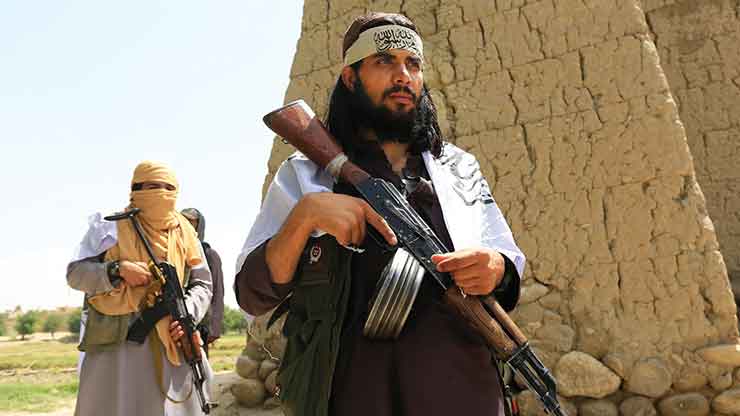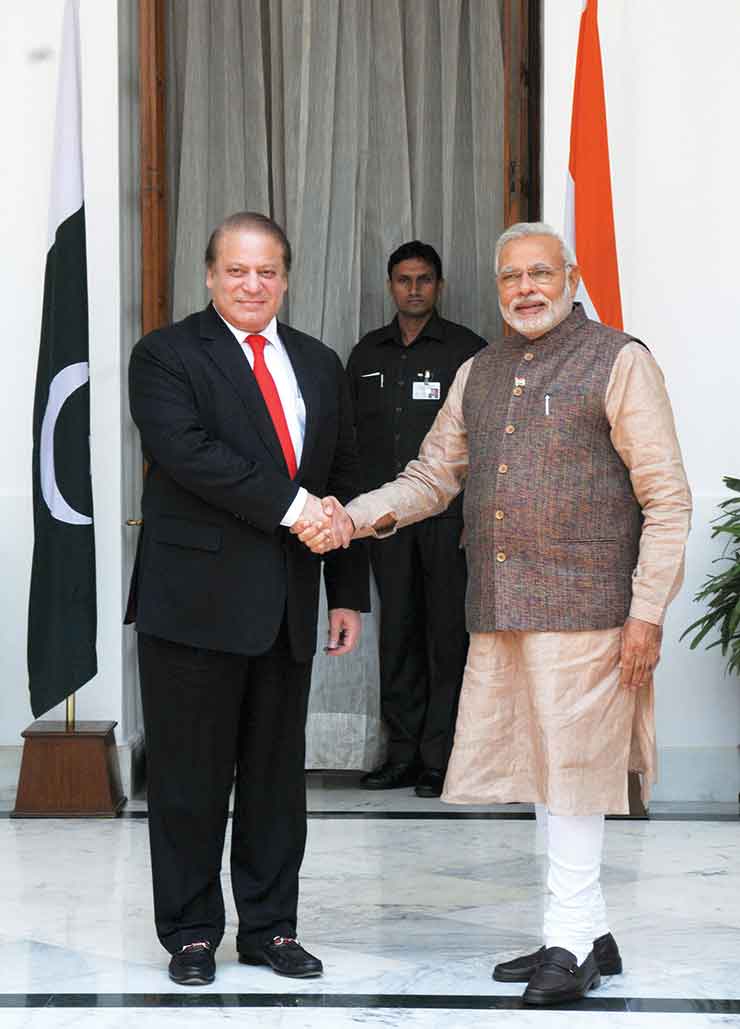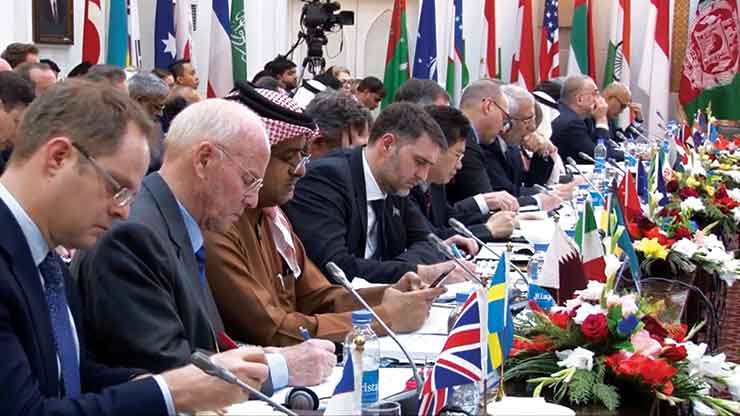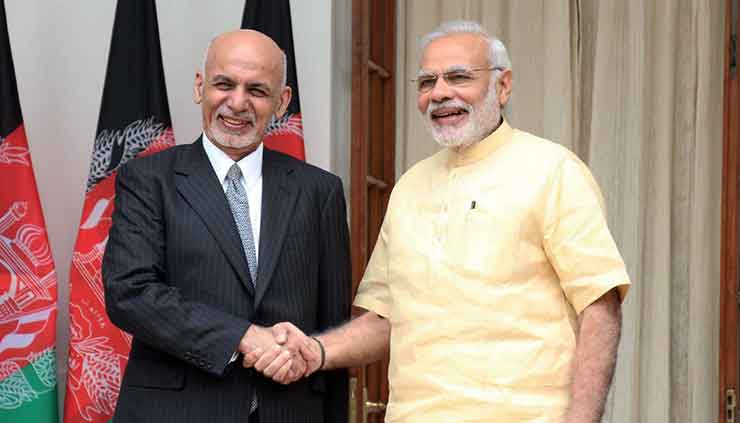
SOUTH ASIAN nations are suffering from terrorism and several regional, national and international terrorist outfits are active in the region. Peace is illusive in the area because of diverse reasons but the most important cause of failure of peaceful negotiations is terrorism. The principal terrorist outfits active in the region include Al Qaeda, the Islamic State of Iraq and the Levant (ISIL) also known as the Islamic State of Iraq & Syria (ISIS), Jaish-e-Mohammed (J-e-M), Lashkar-e-Taiba (L-e-T), Sipah-e-Sahaba Pakistan (SSP), Lashkar-i-Jhangvi, Hizbul Mujahideen, Harkat-ul-Mujahideen etc.
Sometimes these organisations are banned on paper but continue working under new names or on the same names. Out of these, a few terrorist outfits were created and assisted by the sinister Inter Services Intelligence (ISI) as Pakistan has waged a low intensity war against India and want to install puppet regime in Afghanistan. Pakistan is using these terrorist outfits to achieve its goals and inflaming terrorism in the neighbouring countries as part of its foreign policy.
Pakistan-abetted outfits continuously carry out terrorist activities in India and Afghanistan. October 1, 2001 attack on Jammu & Kashmir Assembly in Srinagar and December 13, 2011 attack on Indian parliament took both countries on the verge of war. As fallout of the Pakistani terrorists attack on the Army base at Uri in September 2016 in which 18 valiant soldiers were martyred, 200 Indian soldiers entered the Pakistan Occupied Kashmir (PoK) and killed 40 Pakistani terrorists including guides and their trainers. India, Bangladesh, Afghanistan and Bhutan refused to attend 19th South Asian Association for Regional Co-operation (SAARC).
Not only this, the present government is adhering to the policy that cross-border terrorism and peaceful negotiations cannot go together, hence India constantly refusing Pakistani overtures of starting negotiations. Pakistani Prime Minister Imran Khan sends feelers to start negotiations but does not promise to curb cross-border terrorism. Analysts claim that overtly Pakistan wants to start peaceful negotiations, but covertly will continue infiltrating terrorists in India. Islamabad also wants to show to the world that it wants to start peace negotiations but India is refusing to talk.

The pre-requisite of peaceful negotiation is bilateral trust. In case of peace negotiations between Pakistan-India or Pakistan-Afghanistan both India and Afghanistan have no trust in Pakistan, as military-controlled ISI is involved in fomenting terrorist activities in both countries.
Mutual trust is essential for peace negotiations. In the past Sri Lanka alleged that India was assisting Tamil terrorist outfits, consequently there was trust deficit between both countries; hence there was bitterness between Delhi and Colombo. Same way India has cordial relations with the present Awami League government as there is a confidence that Prime Minister Sheikh Hasina will not allow terrorist outfits to operate from Bangladesh against India.
Terrorism is also a big impediment in Islamabad-Kabul peace talks. Pakistan wants to achieve strategic depth in Afghanistan hence it tries to establish a puppet regime in the country. It has created few terrorist outfits which continuously carry out terrorist activities inside Afghanistan. These terrorist outfits especially the Haqqani network uses asymmetric warfare against Afghan forces as well as US-led NATO troops. The Haqqani network is close to Taliban and has a base at Miramshah or Miranshah, a town and administrative headquarters of North Waziristan in Pakistan.
The United States rendered maximum assistance to the Haqqani network in 1980 but later in 2012 designated it as a terrorist outfit. The ISI renders full assistance to the Haqqani network as it feels that the terrorist outfit will safeguard Pakistan’s interest in war-torn Afghanistan. Islamabad maintains that Iran, Russia, China and India would increase their influence in Afghanistan after departure of the US troops. As Islamabad lacks money power it wants to retain its influence in Kabul through the Haqqani network which has a base in Pakistan. The ISI provides Afghan Taliban especially the Haqqani network intelligence, weapons as well as protection and safe-haven in the country. Pakistan also wants to reduce India’s influence in Afghanistan through these terrorist outfits.
Pakistan is also suspicious that anti-Pakistan terrorist outfits would take refuge in unstable Afghanistan. It is needless to say that diverse separatist movements are active in Pakistan. Pakistan feels that Taliban will remain powerful in Afghanistan and they may be able to obtain power in the country.
Islamabad is also afraid that if action is taken against Afghan Taliban there would be a strong reaction in Pakistan, especially in Punjab and it will be difficult to control. Pakistan also does not want India to have any influence in Afghanistan as it feels that India tries to encircle Pakistan. Pakistan time and again alleges that India assists Baloch rebels through Afghanistan.

Islamabad’s assistance to the Haqqani network proved beneficial, as at present the US is desperate to leave Afghanistan and took Pakistan’s assistance to have rapprochement with Taliban. Following the development, US special representative for Afghanistan Zalmay Khalilzad met the Pakistani authorities in Islamabad on January 17. It is apparent that now Islamabad is mediating between the US and Taliban hence Pakistan has become emboldened and its foreign office spokesperson reverted to the country’s old position that India has no role to play in Afghanistan. The US has also changed its policy that Taliban should negotiate with Afghan government, instead the US agreed with Taliban’s contention and talks were held between Khalilzad and Taliban representatives without Afghan government.
In case of India-Pakistan relations, Islamabad continues to sponsor outfits to carry out terrorist activities in India especially in Kashmir. Pakistan claims insurgency in Kashmir as a freedom struggle. Although Pakistan is aware that terrorism will not resolve Kashmir problem and the former may not be interested in restoration of peace in the valley as its sole aim is to weaken its sworn enemy India. A strong lobby in India feels that Pakistan will continue its terrorist activities until Indian forces destroy terrorist hideouts and training places well inside PoK.
Besides Kashmir issue, there are several other unsettled issues between India and Pakistan, which include Sir Creek, water dispute and most important is the nuclear issue. However, Islamabad claims that nuclear issue comes to the fore following no solution of the Kashmir issue. India fought three wars excluding Kargil, out of these two wars were fought over Kashmir.

The powerful Pakistani army does not want peace with India as it is enjoying multifarious privileges in the name of danger from India. They allege that India has not reconciled with the existence of Pakistan hence there is perpetual danger from the eastern neighbour. On the other hand, Islamic extremists with collusion of army claim that they will capture whole of Kashmir and it will be merged with Pakistan. The hardliners claim that Kashmir is unfinished agenda of 1947 and it has to be liberated. This is the reason that whenever a moderate ruler in Pakistan wants to have peace with India, the hardliners and Islamic extremists sabotage the same. Consequently, the peace negotiation between India and Pakistan either could not be initiated or if started it was derailed because of distrust and terrorism.
In India-Pakistan peace negotiations, terrorists are the main spoilers. In 2008, Pakistani Foreign Minister Shah Mehmood Qureshi came to India to negotiate vital issues including Kashmir, Chenab river water dispute, trade ties etc. But army-controlled ISI infiltrated few Pakistani terrorists of Lashkar-e-Taiba, these terrorists attacked Mumbai and more than 166 innocent people were killed. The then Indian Foreign Minister immediately told Qureshi to leave India as terror and peaceful negotiations cannot go together. The Pakistani foreign minister was sent back and further negotiations were suspended. Hafiz Saeed, who was the architect of this heinous crime, was extolled in Pakistan.
Terrorism is hurting the South Asian nations and Islamabad has emerged as the epicenter of terrorism hence it is the foremost duty of Pakistan to eradicate various terrorist hideouts operating from the country. Pakistan launched several operations to exterminate terrorism, the major anti-terrorist operations included Al-Mizan, Zalzala, Rah-e-Haq, Rah-e-Raast, Rah-e-Nijat, Black Thunderstorm, Sher Dil, Koh-e-Safaid, Zarb-e-Azb, Radd-ul-Fasaad etc. but these operations could not wipe out terrorism because Pakistani authorities distinguished between good and bad terrorists. The outfits carrying out terrorist activities in India and Afghanistan or attacking Shias, Sufis or non-Muslims were considered as good terrorists and were accorded shelter by ISI. Pakistan should treat all terrorists alike and stringent action should be taken against all the terrorists. If Pakistan feels difficult in obliterating terrorists it should take assistance from India, the US, Afghanistan and other nations.

In Pakistan, religious fanatics are also supporting terrorism within and outside the country. Religious fanaticism initiated by General Zia-ul-Haq and fuelled by the petro-dollars is enhancing terrorism. Several thousand registered and unregistered Madrassas are running in the country and several Madrassas are run and controlled by terrorist outfits like L-e-T, J-e-M, SSP, Lashkar-i-Jhangvi etc. These Madrassas produce terrorists and suicide bombers. Pakistan government is afraid to take action against these Madrassas due to the fear of Islam Pasand parties.
Terrorism is one of the main reason that Pakistan has reached on the verge of economic collapse and about to default payment. Prime Minister Imran Khan and other ministers visited Saudi Arabia, China, the UAE and other places with begging bowl. Saudi Arabia and the UAE agreed to render financial assistance while China refused to oblige. According to a report, several thousand Pakistanis were killed due to terrorism and Pakistan lost about $68 billion due to terrorism between 2000 and 2010. It is high time that Pakistani army amends its policy and eradicates terrorism from the country so that South Asia peace process can effectively be implemented in the region.
– The writer is a Delhi-based strategic analyst and member of United Services Institute of India and Institute for Defence Studies and Analyses. The views expressed are personal









